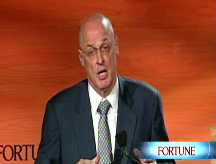Treasury mulls plan to lower mortgage rates to 4.5%
Move would help homeowners and buyers with good credit, but would do little for troubled borrowers, experts said.
NEW YORK (CNNMoney.com) -- Lobbyists are pushing the Treasury Department to consider a plan to purchase mortgage-backed securities in the hopes of driving mortgage rates to as low as 4.5%, an industry source said.
Similar to an effort unveiled last week by the Federal Reserve, the proposal calls for Treasury to buy securities backed by 30-year fixed-rate mortgages from Fannie Mae and Freddie Mac. Details on the plan remain sketchy, but an announcement could come as early as next week, the source said.
The increased demand for mortgage-backed securities would prompt mortgage rates to drop. That, in turn, would enable homeowners to refinance into lower-cost loans and make it cheaper for potential homebuyers to get into the market.
Spokeswomen from Treasury and the Federal Housing Finance Agency, which oversees Fannie Mae (FNM, Fortune 500) and Freddie Mac (FRE, Fortune 500), declined to comment.
Last week's Fed move drove mortgage rates down to 5.5%, from 6.06% a week earlier. The Fed said on Nov. 26 that it would purchase up to $500 billion in mortgage-backed securities from Fannie, Freddie and Ginnie Mae, and that it would buy another $100 billion in direct debt issued by those firms.
Mortgage applications more than doubled as a result, the Mortgage Bankers Association said Wednesday. Much of the activity stemmed from homeowners looking to refinance.
Industry groups have been pressuring President-elect Barack Obama and lawmakers to lend a helping hand to the housing market. The National Association of Realtors, for instance, has called for Treasury to buy mortgage-backed securities.
Meanwhile, a coalition of industry groups have banded together under the "Fix Housing First" banner to call for measures including tax credits of up to $22,000 and the creation of a 30-year mortgage, carrying rates as low as 2.99%.
Experts, however, had mixed views on how much a new Treasury initiative would help homeowners and the economy. Some felt lower rates would help stabilize the housing market by bringing in new buyers and would give those who refinance more money to spend.
"If it gets people buying homes and spending, it will help reverse the economy and get us out of this recession," said Scott Talbot, senior vice president of the Financial Services Roundtable, which is pushing the measure.
While it takes time to entice new buyers into the market, low rates accelerate that process, said Greg McBride, senior financial analyst at Bankrate.com.
"It is clearly designed to bring buyers into the marketplace and soak the inventory of unsold homes," he said.
But others questioned whether rates would remain low and, even if they did, only a narrow slice of credit-worthy borrowers would benefit.
Rates are already inching up, hitting 5.75% on Wednesday, said Keith Gumbinger, vice president of HSH Associates. Several government attempts to lower mortgage rates this year have failed to have a lasting effect.
Also, the proposal would do little to help troubled borrowers who have fallen behind on their payments, have no equity in their homes or have lost their jobs. With credit standards still high, these homeowners would not be able to refinance and take advantage of the lower rates, he said.
Finally, super-low rates could keep private investors out of the mortgage-backed securities market, forcing the government to remain the primary buyer of such investments, Gumbinger said. Rates have not fallen below 5.37% in more than 45 years.
"I can't imagine there will be a significantly active marketplace of people who want to buy at these low rates," he said. ![]()


